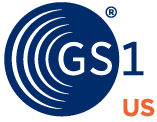Guideline Offers Overview of Foundational Data Elements and Standards to Enable Supply Chain Visibility
EWING, NJ - March 11, 2020 - GS1 US has published a new guideline titled “Applying GS1 Standards for Supply Chain Visibility in Blockchain Applications,” an educational resource that can help industry enable supply chain visibility in blockchain implementations by leveraging GS1 Standards.
The guideline demonstrates how multiple GS1 Standards can be utilized in a blockchain ecosystem to optimize data sharing. For example, the EPCIS (Electronic Product Code Information Services) standard allows supply chain partners to capture transactional information about supply chain events (e.g., when a product was shipped and when it was received) and share that information with their trading partners. EPCIS is in use today across various industries and helps document product chain of custody across trading partner networks when used for blockchain. Common use cases for blockchain in the supply chain include food and drug traceability, product sourcing transparency and order-to-cash process automation in retail.
“Launching any blockchain program without first adopting standards means supply chain partners risk sharing potentially bad data on a permanent ledger,” said Kraig Adams, vice president, blockchain, GS1 US. “GS1 Standards help ensure that all parties involved are sharing data consistently, which enhances interoperability and data quality. The guideline is a starting point for those who want to take a thoughtful approach and realize the maximum benefits of blockchain.”
The guideline was developed by GS1 US in collaboration with the GS1 US Cross-Industry Blockchain Discussion Group, formed in November 2018 to help companies better understand the transformative qualities of blockchain in the supply chain, and prepare for blockchain implementations using GS1 Standards. The group comprises more than 80 organizations including leading manufacturers, distributors, foodservice operators, retailers and associations across the foodservice, retail grocery, healthcare and apparel and general merchandise sectors.
Blockchain implementation best practices will be among the topics discussed at GS1 Connect 2020, being held June 16-18, 2020 in Las Vegas, Nevada. To learn more about the conference agenda and to register, please visit www.gs1connect.org.
For more information about how GS1 Standards support blockchain success, please visit www.gs1us.org/blockchain.
About GS1 US
GS1 US®, a member of GS1 global, is a not-for-profit information standards organization that facilitates industry collaboration to help improve supply chain visibility and efficiency through the use of GS1 Standards, the most widely used supply chain standards system in the world. Nearly 300,000 businesses in 25 industries rely on GS1 US for trading partner collaboration that optimizes their supply chains, drives cost performance and revenue growth, while also enabling regulatory compliance. They achieve these benefits through solutions based on GS1 global unique numbering and identification systems, barcodes, Electronic Product Code (EPC®)-based RFID, data synchronization and electronic information exchange. GS1 US also manages the United Nations Standard Products and Services Code® (UNSPSC®). For more information, please visit www.gs1us.org.

